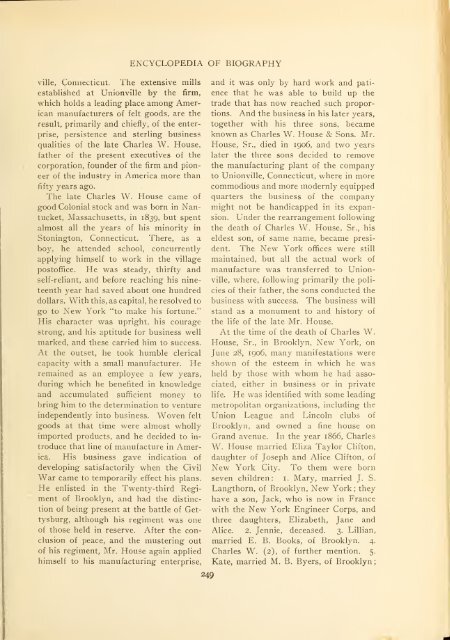Encyclopedia of Connecticut biography, genealogical-memorial ...
Encyclopedia of Connecticut biography, genealogical-memorial ...
Encyclopedia of Connecticut biography, genealogical-memorial ...
You also want an ePaper? Increase the reach of your titles
YUMPU automatically turns print PDFs into web optimized ePapers that Google loves.
ville, <strong>Connecticut</strong>. The extensive mills<br />
established at Unionville by the firm,<br />
which holds a leading place among Amer-<br />
ican manufacturers <strong>of</strong> felt goods, are the<br />
result, primarily and chiefly, <strong>of</strong> the enter-<br />
prise, persistence and sterling business<br />
qualities <strong>of</strong> the late Charles W. House,<br />
father <strong>of</strong> the present executives <strong>of</strong> the<br />
corporation, founder <strong>of</strong> the firm and pion-<br />
eer <strong>of</strong> the industry in America more than<br />
fifty years ago.<br />
The late Charles W. House came <strong>of</strong><br />
good Colonial stock and was born in Nan-<br />
tucket, Massachusetts, in 1839, but spent<br />
almost all the years <strong>of</strong> his minority in<br />
Stonington, <strong>Connecticut</strong>. There, as a<br />
boy, he attended school, concurrently<br />
applying himself to work in the village<br />
post<strong>of</strong>fice. He was steady, thirfty and<br />
self-reliant, and before reaching his nineteenth<br />
year had saved about one hundred<br />
dollars. With this, as capital, he resolved to<br />
go to New York "to make his fortune."<br />
His character was upright, his courage<br />
strong, and his aptitude for business well<br />
marked, and these carried him to success.<br />
At the outset, he took humble clerical<br />
capacity with a small manufacturer. He<br />
remained as an employee a few years,<br />
during which he benefited in knowledge<br />
and accumulated sufficient money to<br />
bring him to the determination to venture<br />
independently into business. Woven felt<br />
goods at that time were almost wholly<br />
imported products, and he decided to introduce<br />
that line <strong>of</strong> manufacture in Amer-<br />
ica. His business gave indication <strong>of</strong><br />
developing satisfactorily when the Civil<br />
War came to temporarily effect his plans.<br />
He enlisted in the Twenty-third Regiment<br />
<strong>of</strong> Brooklyn, and had the distinc-<br />
tion <strong>of</strong> being present at the battle <strong>of</strong> Gettysburg,<br />
although his regiment was one<br />
<strong>of</strong> those held in reserve. After the con-<br />
clusion <strong>of</strong> peace, and the mustering out<br />
<strong>of</strong> his regiment, Mr. House again applied<br />
himself to his manufacturing enterprise,<br />
ENCYCLOPEDIA OF BIOGRAPHY<br />
249<br />
and it was only by hard work and pati-<br />
ence that he was able to build up the<br />
trade that has now reached such propor-<br />
tions. And the business in his later years,<br />
together with his three sons, became<br />
known as Charles W. House & Sons. Mr.<br />
House, Sr., died in 1906, and two years<br />
later the three sons decided to remove<br />
the manufacturing plant <strong>of</strong> the company<br />
to Unionville, <strong>Connecticut</strong>, where in more<br />
commodious and more modernly equipped<br />
quarters the business <strong>of</strong> the company<br />
might not be handicapped in its expan-<br />
sion. Under the rearrangement following<br />
the death <strong>of</strong> Charles W. House, Sr., his<br />
eldest son, <strong>of</strong> same name, became presi-<br />
dent. The New York <strong>of</strong>fices were still<br />
maintained, but all the actual work <strong>of</strong><br />
manufacture was transferred to Union-<br />
ville, where, following primarily the poli-<br />
cies <strong>of</strong> their father, the sons conducted the<br />
business with success. The business will<br />
stand as a monument to and history <strong>of</strong><br />
the life <strong>of</strong> the late Mr. House.<br />
At the time <strong>of</strong> the death <strong>of</strong> Charles W.<br />
House, Sr., in Brooklyn, New York, on<br />
June 28, 1906, many manifestations were<br />
shown <strong>of</strong> the esteem in which he was<br />
held by those with whom he had asso-<br />
ciated, either in business or in private<br />
life. He was identified with some leading<br />
metropolitan organizations, including the<br />
Union League and Lincoln clubs <strong>of</strong><br />
Brooklyn, and owned a fine house on<br />
Grand avenue. In the year 1866, Charles<br />
W. House married Eliza Taylor Clifton,<br />
daughter <strong>of</strong> Joseph and Alice Clifton, <strong>of</strong><br />
New York City. To them were born<br />
seven children: 1. Mary, married J. S.<br />
Langthorn, <strong>of</strong> Brooklyn, New York ; they<br />
have a son, Jack, who is now in France<br />
with the New York Engineer Corps, and<br />
three daughters, Elizabeth, Jane and<br />
Alice. 2. Jennie, deceased. 3. Lillian,<br />
married E. B. Books, <strong>of</strong> Brooklyn. 4.<br />
Charles W. (2), <strong>of</strong> further mention. 5.<br />
Kate, married M. B. Byers, <strong>of</strong> Brooklyn;

















